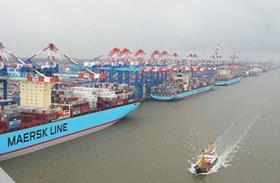
AP Moller-Maersk has joined forces with Wallenius Wilhelmsen, BMW Group, H&M Group, Levi Strauss & Co and Marks & Spencer to explore LEO - a blend of lignin and ethanol - that could be part of the future solution for sustainable shipping.
Shipping accounts for 2-3 per cent of global CO2 emissions, a proportion that is set to increase as global trade continues to grow at a sluggish but steady pace. As such, the industry has an 'urgent need to reduce its environmental impact', according to Maersk.
The new alliance, along with Copenhagen University, have formed the LEO Coalition, which will explore the environmental and commercial viability of LEO fuel for shipping.
“Shipping requires bespoke low-carbon fuel solutions which can make the leap from the laboratory to the global shipping fleet. Initiatives such as the LEO Coalition are an important catalyst in this process,” explained Søren Toft, Maersk chief operating officer.
Lignin is a structural bio-polymer which contributes to the rigidity of plants, and is isolated in large quantities as a byproduct of lignocellulosic ethanol and pulp and paper mills. Currently, it is often incinerated to produce steam and electricity.
“Our customers’ ambitions on sustainability are increasing rapidly, and we applaud this development,' said Craig Jasienski, Wallenius Wilhelmsen CEO.'Clearly, LEO would be a great step forward for supply chain sustainability, and it has the potential to be a viable solution for today’s fleet, and not just a future vision.'
Leading companies in many sectors are actively exploring solutions to reduce emissions along their entire value chains, as part of the global recognition of the importance of sustainably meeting the world’s demand for goods - including the transportation and logistics sector which delivers those goods.
Copenhagen University is currently running the laboratory-scale development of this potential marine fuel.
The project aims to move into phase II – testing the fuel on actual vessel engines – in the second quarter of 2020. Following a successful phase II, phase III will begin – the scaling up of LEO fuel production.



